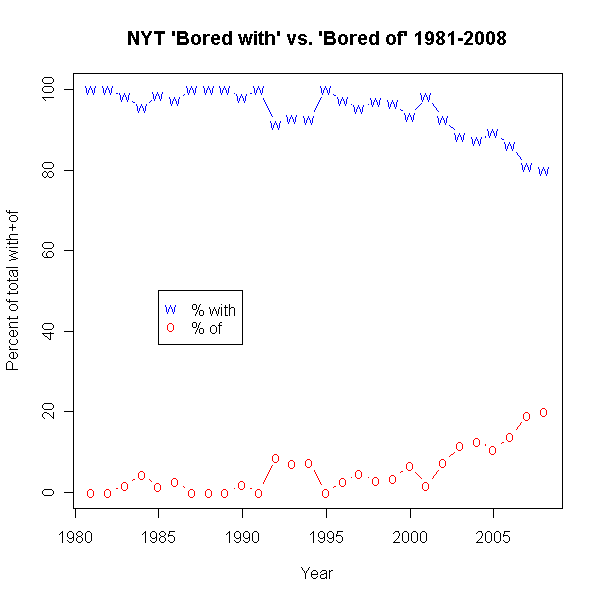Archive for September, 2009
Dan Brown's new one: where's Pullum?
Commenters on this blog and others, and many of my correspondents, have been asking: "Where is Pullum?"
I am on a train in England, using unspeakably slow wireless Internet. And I have a copy of Dan Brown's The Lost Symbol cradled in my palms.
Permalink Comments off
The Dan Brown contest
I'm not usually on the Dan Brown desk here at Language Log Plaza — that's Geoff Pullum's domain — but this one came to me (from Bruce Webster). By Tom Chivers on the Telegraph's site:
The Lost Symbol, the latest novel by The Da Vinci Code author Dan Brown, has gone on sale. We pick 20 of the clumsiest phrases from it and from his earlier works.
Chivers quotes Geoff P. on Brown's writing. And there's space for comments and for nominations of further regrettable quotes from the Brownian oeuvre.
Bundling
Recently, we've been talking, here and here, about the choice of preposition to go with the adjective bored: the older with (or by) or the innovative (and now spreading) of. Commenters added some other choices of of where another preposition might have been expected: with the adjectives concerned, embarrassed, and fed up; and with verbs in appreciate of and succumb of. There are several possible routes to these usages — analogy with P choice for semantically similar words (bored of on analogy with tired of), blending (bored of = bored with x tired of), and reversion to of as the default P in English — but the cases are at least superficially similar (though they are probably not related at a deeper level; people with one of these usages can't be expected to have any, or all, of the others).
And then a commenter (on the first of these postings) moved to a very different case; dw asked about off of, adding, "It drives me nuts". The only thing that this case — of what some handbooks term "intrusive" of in combination with certain prepositions — has to do with things like bored of is that the word of is involved. Still, people like dw, and a great many usage critics as well, are inclined to "bundle" disparate phenomena under a single heading for no reason beyond the involvement of a particular word. As I said recently, people are inclined to "blame it on a word".
Read the rest of this entry »
Permalink Comments off
Localization of emotion perception in the brain of fish
This is beautiful work, showing that certain areas in the brain of mature Atlantic Salmon "light up" when the animal is asked to categorize the emotions expressed by a set of (human) faces:

Read the rest of this entry »
More bored of than before
Following up on this morning's "bored" post, I wrote a little script to query the NYT's index for the number of uses of "bored of" vs. "bored with" from 1981 to the present. Although the number are fairly small and thus somewhat unstable (in 1981 there were 72 instances of "bored with" and none of "bored of"; in 2008 there were 48 instances of "bored with" and 12 of "bored of"), the results lend further plausibility to the idea that there's a change in progress, with of gaining ground on with during the past decade:
Read the rest of this entry »
Warning: Harper's Magazine has no content
I was surprised when the mail brought me my October issue of Harper's, where on page 43 was Harper's full-page ad, defining the word, "content," in what seemed to me to be an unusual and counterproductive way.
The ad says:
WARNING! Harper's Magazine is 100% Content Free! Everybody gives you "content." But you'll never find that in Harper's Magazine. Instead, you'll get literature. Investigative reporting. Criticism. Photojournalism. Provocative adventures. Daring commentary. And truth-telling as only Harper's Magazine can tell it. Subscribe today and join the thoughtful, skeptical, witty people just like you who pay for culture, not content.
Read the rest of this entry »
Permalink Comments off
Ask Language Log: "bored of"
Sarah Currier asked:
Last night I was reading a beautifully written, prize-nominated novel, but was thrown out of my immersion in it by what I thought was an anachronistic bit of language. I do have a particular fingernails-down-the-blackboard reaction to "bored of" and I am convinced it is fairly recent as common usage. I am 43, grew up in New Zealand, but now live in Scotland.
This passage is set in 1960 and is between the narrator and his then elderly mother:
"She is too sincere for you," she said after a short pause.
"Sincere?"
"You will become bored of her, just as I became bored of your father".
The woman using "bored of" is also an Austrian Jew who escaped to England during WWII. So English is her second language.
I just found that really jarring, especially in such a beautifully written literary novel. My partner thinks I am mad.
Read the rest of this entry »
English libel laws and science reporting
A couple of days ago, Olivia Judson discussed the effects on science writing of the execrable state of English libel law, with some details of the British Chiropractic Association's libel case against Simon Singh, and a bit about Mattias Rath's case against Ben Goldacre: "Cracking the Spine of Libel", NYT, 9/15/2009. There's an excellent list of links at the end of her post.
We discussed a central linguistic aspect of the case against Singh here a few months ago ("Knowing bogosity", 4/11/2009).
More curve-bending
Following up on Mark's post about William Safire's latest On Language column, "Bending the curve," I wanted to share some of the citational history of this particular idiom, as I've been able to piece it together. The brief story can be found in my Aug. 21 Word Routes column on the Visual Thesaurus, "The Lexicon of the Health Care Debate." What follows is the long story.
Read the rest of this entry »
Rhetorical curveball
Here's the first sentence of William Safire's latest On Language column, "Bending the curve":
Taking on the issue of the cost of health care, a Washington Post editorialist intoned recently that “knowing more about which treatments are effective is essential” — knowing about when to use a plural verb is tough, too — “but, without a mechanism to put that knowledge into action, it won’t be enough to bend the cost curve.”
The phrase in boldface blue was too much for reader Anthony Ambrosini:
Am I missing something? Which with a plural verb just implies a plural response to the question, and I doubt he thinks that knowing should take a plural verb. What's he on about?
Read the rest of this entry »
Botty man
The Jamaican Creole phrase often spelled batty man, pronounced ['bati'man] (also botty boy ['bati'bwai]), would be more easily interpreted by other English speakers if it were spelled botty man, since the first element is botty, a familiar British hypocorism for bottom. (My point about the spelling is not a prescriptive one; I'm merely pointing out that the first syllable sounds like Standard English bot, not bat.) The literal meaning of the phrase into American English would be "butt man" or "ass man", and the free translation is "homosexual" (trading, of course, on the juvenile assumption that all gays are ever interested in is bottoms). The phrase appeared in a note near the naked corpse of John Terry, found at his home in Montego Bay last week. It saddened me to see, in a week when one country atoned just a little for its homophobic past with a genuine apology from its government, another country continuing to forge a place for itself in the annals of intolerance and moral backwardness.
Read the rest of this entry »
Permalink Comments off


